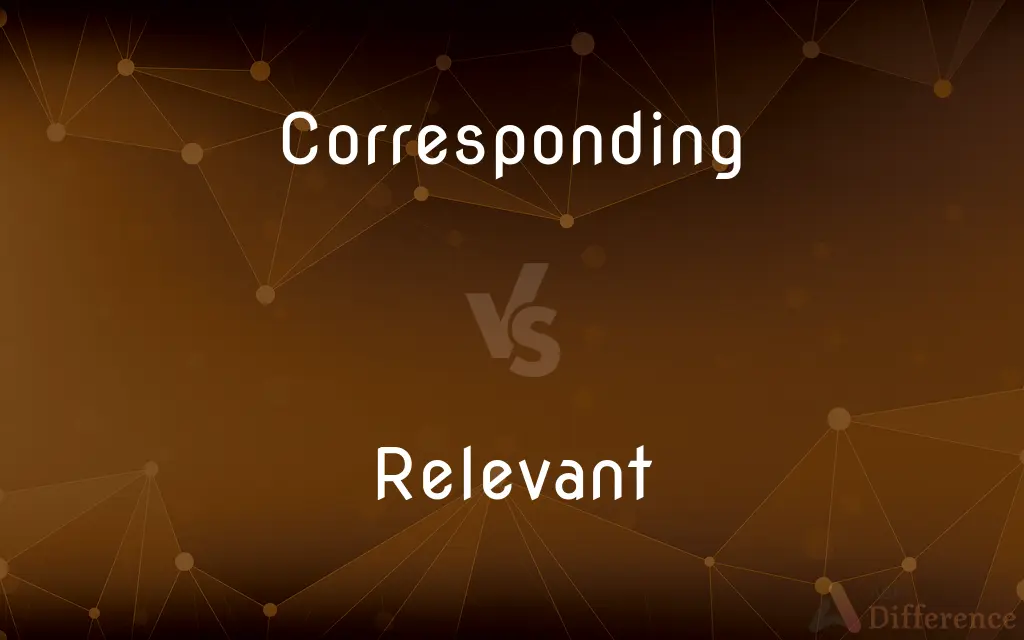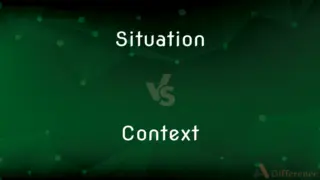Corresponding vs. Relevant — What's the Difference?
By Urooj Arif & Fiza Rafique — Updated on April 20, 2024
Corresponding refers to something that matches or corresponds to another in a specific way, implying a direct relationship, while relevant pertains to how pertinent or applicable something is to the matter at hand, focusing on usefulness and context.

Difference Between Corresponding and Relevant
Table of Contents
ADVERTISEMENT
Key Differences
Corresponding items are often directly linked through similarity or equivalence in form, function, or position; whereas, relevant items are evaluated based on their importance or usefulness to a specific context or situation.
In academic writing, corresponding sections in two papers might address similar themes or methods, highlighting a direct match; on the other hand, relevant studies or data are those that significantly contribute to understanding or supporting the academic argument.
In technology, corresponding parts in different machines might share design specifications making them interchangeable, while relevant technology refers to tools or software that effectively address current needs or problems.
When discussing events, corresponding dates might refer to the same dates across different years, such as annual celebrations, whereas relevant events are those that have significance or impact at the time being considered.
In communications, corresponding messages are replies or responses that align directly with initial inquiries or statements, whereas relevant messages are those that add value to the conversation by being contextually appropriate.
ADVERTISEMENT
Comparison Chart
Definition
Matches or aligns with something in a specific way
Pertinent or applicable to a situation
Focus
Similarity, equivalence
Importance, usefulness
Usage Example
Corresponding author on a paper
Relevant information in research
Relationship
Direct and matching
Context-specific applicability
Typical Contexts
Academics, technical specifications
Decision making, research contexts
Compare with Definitions
Corresponding
Communicating by exchanging letters.
They were corresponding regularly before the advent of email.
Relevant
Closely connected or appropriate to the matter at hand.
Make sure to include all relevant details in the report.
Corresponding
Designated as a counterpart.
He was the corresponding secretary of the club.
Relevant
Bearing upon or connected with the subject.
The lawyer questioned whether the evidence was relevant.
Corresponding
Matching or equivalent in a specified manner.
Each item in the list had a corresponding code.
Relevant
Applicable to current issues or circumstances.
The course offers relevant skills for the digital age.
Corresponding
Aligned or paired in consideration.
The results of the study are corresponding to earlier findings.
Relevant
Pertinent to a particular matter; germane.
Her comments were very relevant to the ongoing discussion.
Corresponding
Similar or analogous in function or position.
The vice president of the branch is the corresponding authority to the CEO in headquarters.
Relevant
Having significant and demonstrable bearing on the matter.
Relevant research supports the theory.
Corresponding
Having the same or nearly the same relationship.
Relevant
Closely connected or appropriate to what is being done or considered
The candidate's experience is relevant to the job
What small companies need is relevant advice
Corresponding
Accompanying another
A high corporate position and its corresponding problems.
Relevant
Having a bearing on or connection with the matter at hand.
Corresponding
Having been assigned the responsibility of written communications
A corresponding secretary.
Relevant
Meaningful or purposeful in current society or culture
Thought that the traditional male role of breadwinner was no longer relevant.
Corresponding
Participating at a distance from the rest of a group
A corresponding member of the bar association.
Relevant
Related, connected, or pertinent to a topic.
Corresponding
Present participle of correspond
Relevant
(Usually and especially) Directly related, connected, or pertinent, with important ramifications or implications.
His mother provided some relevant background information concerning his medical condition.
Corresponding
A correspondence; the situation where things correspond or match.
Relevant
Not out of date; current.
Corresponding
That have a similar relationship
Relevant
Relieving; lending aid or support.
Corresponding
Answering; conformable; agreeing; suiting; as, corresponding numbers.
Relevant
Bearing upon, or properly applying to, the case in hand; pertinent; applicable.
Close and relevant arguments have very little hold on the passions.
Corresponding
Carrying on intercourse by letters.
Relevant
Sufficient to support the cause.
Corresponding
Accompanying;
All rights carry with them corresponding responsibilities
Relevant
Having a bearing on or connection with the subject at issue;
The scientist corresponds with colleagues in order to learn about matters relevant to her own research
Corresponding
Similar especially in position or purpose;
A number of corresponding diagonal points
Relevant
Having crucial relevance;
Crucial to the case
Relevant testimony
Corresponding
Conforming in every respect;
Boxes with corresponding dimensions
The like period of the preceding year
Corresponding
Agreeing in amount, magnitude, or degree;
The figures are large but the corresponding totals next year will be larger
Common Curiosities
How do I know if information is relevant?
Information is relevant if it is pertinent and applicable to the current situation or problem.
What are examples of corresponding roles in organizations?
Corresponding roles could include positions like branch manager and head office manager, which align in responsibilities across locations.
What does it mean when two items are corresponding?
It means they match or align directly in form, function, or role.
What does it mean for two variables to be corresponding in research?
In research, corresponding variables are those that represent the same type of data or concept in different datasets or studies, allowing for direct comparison or linkage.
Can corresponding documents differ in content?
Yes, corresponding documents can differ in details and specific content but share a similar structure or purpose, such as templates used across different departments of a company.
Can something be corresponding but not relevant?
Yes, something can correspond (match) with another item but might not be relevant (useful or applicable) to a particular discussion or context.
How can relevance affect decision making?
Relevance greatly impacts decision making by focusing on the importance and usefulness of information, ensuring decisions are informed and applicable.
How does relevance relate to effectiveness in a business context?
In a business context, relevance directly relates to effectiveness as it ensures that strategies, decisions, and communications are aligned with current business goals, market conditions, and customer needs.
Why is it important to identify relevant issues in a discussion?
Identifying relevant issues helps focus the discussion on matters that are significant and impactful, enhancing the efficiency and effectiveness of communication and decision-making processes.
Is it possible for something to become more relevant over time?
Yes, as circumstances, technologies, and societal norms evolve, certain information, skills, or topics can become more relevant based on their increased applicability or importance in the new context.
Can technological tools be both corresponding and relevant?
Technological tools can be both corresponding and relevant if they not only match in specifications or functionalities across systems but also effectively address current operational or business needs.
What is an example of corresponding parts in nature?
An example includes bilateral symmetry in animals, where parts on one side of the body correspond in size, shape, and function to parts on the other side.
How do educators determine the relevance of curriculum content?
Educators assess the relevance of curriculum content by considering the applicability to the students' future needs, the current trends in the field of study, and alignment with educational standards and outcomes.
What role does relevance play in legal arguments?
Relevance is crucial in legal arguments as it determines whether evidence or testimony directly pertains to the case at hand, influencing the outcome by focusing on pertinent facts and legal precedents.
How can corresponding theories be identified in academic disciplines?
Corresponding theories in different academic disciplines can be identified by comparing their foundational assumptions, methodologies, and conclusions, looking for alignments that transcend the specific subject matter.
Share Your Discovery

Previous Comparison
Situation vs. Context
Next Comparison
Attribute vs. TraitAuthor Spotlight
Written by
Urooj ArifUrooj is a skilled content writer at Ask Difference, known for her exceptional ability to simplify complex topics into engaging and informative content. With a passion for research and a flair for clear, concise writing, she consistently delivers articles that resonate with our diverse audience.
Co-written by
Fiza RafiqueFiza Rafique is a skilled content writer at AskDifference.com, where she meticulously refines and enhances written pieces. Drawing from her vast editorial expertise, Fiza ensures clarity, accuracy, and precision in every article. Passionate about language, she continually seeks to elevate the quality of content for readers worldwide.
















































